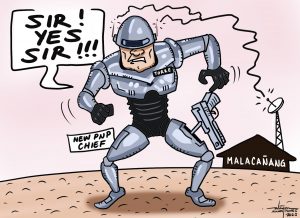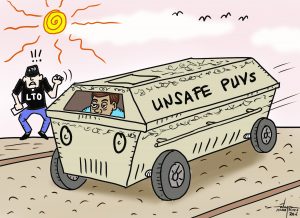After the Corona Virus or CoVid 19, leaves someday, what do we need to do to regain our lives and to revive our economy – knowing that things will never be “NORMAL” again. The NEW NORMAL will require a new paradigm.
In the next couple of columns, I have asked selected political and business leaders (some of whom are classmates, friends, and relatives) to share their opinions and suggestions on how we can revive our economy – under siege by this virus.
The first contributor is Carlos “Charlie” Borromeo, my classmate at Ateneo de Manila College `65 – the class which includes D.O.F. Secretary Carlos “Sonny” Dominguez and Sen. Dick Gordon.
This is his piece on why staying at home could kill a country’s economy faster than COVID-19 can kill people.
“Ever since the USA and the Philippines started taking action to reduce and stop the alarming spread of the Covid-19 virus I began to monitor on TV and social media the growing global efforts to combat this deadly scourge while under “shelter in place” in my home in San Francisco.
“I watched global news as countries began prescribing wearing masks, washing hands, not touching one’s face, social distancing and the most emphasized of all was STAYING AT HOME which was enforced through varying degrees of lockdowns, reduced frequencies of public transportation (land, air and sea) and restrictions on public/social gatherings.
“While Covid-19’s deadly virus was killing people in increasing numbers, the growing government restrictions on people’s ability to go about their daily livelihood and socialization routines were very quickly shutting down and bringing countries’ economies to a deadly standstill. All revenues, private and government, were taking an instant beating that affected a country’s ENTIRE population unlike Covid-19 which, although spreading exponentially, was taking a toll in relatively minuscule percentages of countries’ populations.
“The world was witnessing a situation where the cures were having effects that were quickly becoming worse and deadlier than the disease itself.
The mantra of most countries as their effective solution to avoiding a small percentage of their country’s population getting Covid-19 virus was for everybody (with health frontliners and vital service workers getting exemptions) to STAY AT HOME. This “solution” actually became a bigger threat to the survival of a country’s people because it IMMEDIATELY crippled their ability to support themselves so they had to rely on their government to fund their day to day basic needs even though the government’s revenue streams had likewise started to suffer huge reductions. Under such an economic breakdown scenario
any form of direct government assistance to its people cannot possibly be sustainable for any more than a few months at best.
A few days ago I watched a social media video replay of President Duterte saying that his government was applying P270 billion of the savings of P300 billion accumulated during his first two years towards direct cash and food assistance to the poorest of the poor during the Covid-19 crisis. He also said that he realized the funds were good only for two months so he was directing DOF Secretary Sonny Dominguez to look for, borrowing if needed, more funds to support the poorest of the poor and to include the middle class if possible because they too have lost their income due to the STAY AT HOME period. The president also correctly stated that the government cannot just print money for this because a government can only print as much money as the country’s economic worth can support. He is of course correct, because the value of a country’s currency is only as strong as its economy. Thus when an economy grinds to a halt it can expect the value of its currency in circulation to diminish so that the money that people are holding will gradually buy them less goods. While there is a solution at hand for such a situation that can be the subject of another article.
Meantime we can anticipate that when an entire population loses its ability to earn their daily bread and their government is no longer able to provide them with interim aid, hunger and desperation will drive people to take to the streets to find ways to feed themselves. STAY AT HOME will be difficult to enforce because people know that if they just STAY AT HOME and the government runs out of funds to assist them they could be seriously debilitated by undernourishment or starvation – possibly even die – if Covid-19 doesn’t kill them first.
Worrisome? Yes, but if we calm down for a moment and think about what we have on hand we can find practical ways to use what we have to resolve our Covid-19 concerns quickly. The first order of the day will be to restart the economy. The population workforce is still out there, sitting in their homes. Government just needs to lay the groundwork for people to be able to safely and quickly return to their workplaces.
Now the president has said that the government has P270 billion to spend on supporting the basic needs of the poorest of the poor who are daily earners and perhaps even include middle class monthly earners during this crisis. Rather than distributing all of those funds in the form of cash and food like the proverbial distribution of fish, the government can consider using these funds to get the people to safely return and safely work in their regular places of work. Give them ‘fishing nets’ and put them back in their ‘fishing boats’ (their regular places of work), so to speak. Apply part of that P270 billion funding to restart regular public transportation services to transport people to their workplaces but equip the boarding stations and vehicles with hand washing facilities equipped with water, soap and disinfectants, distribute masks at a nominal price or for free (if possible) for all workers, employees and ‘underground’ street workers and distribute protective clothing at a nominal price or employer-subsidized for people
who will be most exposed by their line of work. Increase the frequencies of public transportation to allow for the reduced number of passengers per vehicle resulting from the social spacing that needs to be observed inside vehicles. Require employers to provide wash stations, masks, protective clothing and social distancing within their work places. Then apply the bulk of that P270 billion fund to setting up medical facilities in government and private hospitals to handle the Covid-19 cases that will surely still be coming in so that those who do contract the virus can be assured they will receive life-saving care when they check into a hospital or Covid-19 care facility. Covid-19 will continue to infect some people but this virus can be defeated when vaccines and medications are developed just as SARS, HIV, Spanish Flu, and other pandemics had been defeated. But if the solution is to STAY AT HOME in the meantime then it is the health of the country’s economy that will be immediately defeated by the fear of Covid-19. A defeated and failed economy will quickly immobilize a country and its people could find themselves in ugly uncontrolled civil unrest situations in the streets. While people can be provided protection from the virus by closeting them in their homes as their ‘first line of defense’ the economy also needs to be protected from crashing by allowing its main drivers – the working class – to safely return to their workplaces so they can get the economy running healthily again.
Private sector can provide a great deal of support in returning the economy to normal by restarting their operations – with the safety of their employees foremost in their minds. Employers can make their factories and offices as virus-proof and as safe as possible for their employees. And aside from their usual products and services there are certain companies that can retool so they can manufacture ventilators. Garment factories can allocate a certain portion of their facilities and work force to produce masks and protective clothing.
Pharmaceutical laboratories can increase production of Vitamin C and other immune system-building supplements for distribution by employers and government to their employees and workers. All together we can get our economy back to normal within a very short period of time. True, some will contract Covid-19 and some will die but a government needs to prioritize getting its economy back on track by getting people safely to work and safely at work. If the solution is just to STAY AT HOME both people and government will very soon run out of funds and food, and we and our country will face bigger and uglier casualties through hunger and civil chaos than Covid-19 can conceivably cause. Let us safely take people out of their homes and safely ensconced everyone in their economic workstations – be it a factory, an office or a government post. God bless us all. God bless the Philippines.
About the author: Carlos Borromeo is a Filipino senior who lives in the USA. He was Chairman of the Philippine National Railways (PNR), Undersecretary for Railways and Mass Transit projects in the Philippines’ Department of Transportation and Communications (DOTC) during the presidency of Joseph Estrada; Assistant Minister and National Resource Expert for Water of the Ministry of Human Settlements under Imelda Marcos, among others. Today he is actively working in developing asset-backed digital currencies and P2P digital payment systems that are designed to reduce the impact of certain industries on the environment and climate change. He co-founded with his wife two foundations in support of people with autism (USA and the Philippines). He was educated in Ateneo de Manila and has a degree in Economics (Class of 1965).


